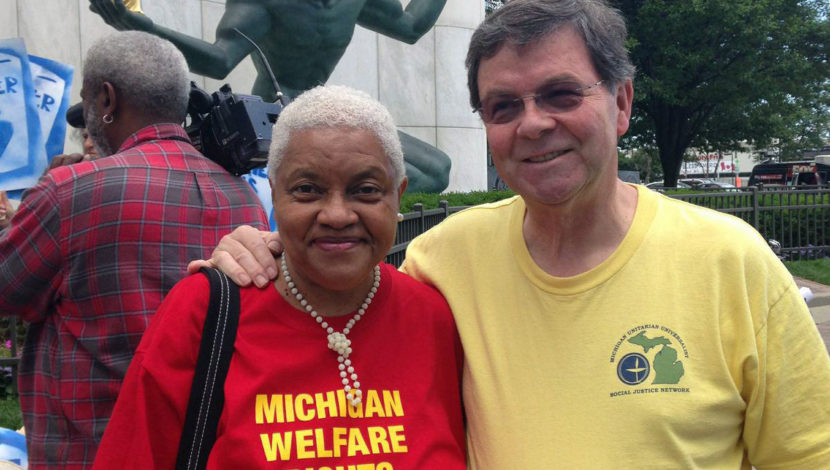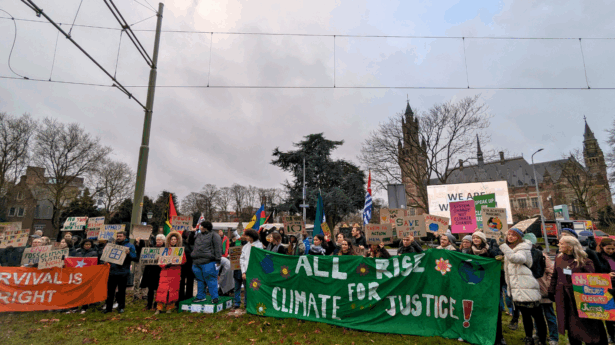The Unitarian Universalist Service Committee advances human rights through grassroots collaborations.
March 18, 2016, Rights Reading

March 18, 2016
Standing Up for What’s Right
Our weekly roundup of what we’re reading: a few select articles from the front lines of human rights that we don’t want you to miss.
1. “Flint Families Come to Washington to Demand Answers and Solutions from Rick Snyder,” by Kenneth Quinnell, AFL-CIO
“Duell is a single parent. She experienced bleeding from the ears following the water exposure and struggles to afford the city’s extremely high water bills. Her son, David, is 10.”
That’s the story of just one family in Flint who has been affected by the water crisis there. This article details how five Flint families journeyed to Washington, D.C., with the AFL-CIO and Flint Rising to deliver a strong message to their elected officials that this crisis is unacceptable.
Besides the horrific health consequences of Flint’s contaminated water, of particular note is the fact that this single mother struggles to pay her water bill. UUSC has been working on the issue of water affordability with partners on the ground in Michigan — and throughout the country — for several years and will soon be releasing a series of reports and recommendations to help continue pushing forward advocacy for commensense solutions that ensure people’s human right to water. No family should have to choose between putting food on their table and paying their water bill.
2. “Farmworkers, Consumers Declare National Boycott of Wendy’s,” by the Coalition of Immokalee Workers (CIW)
“Wendy’s has chosen public relations over human rights protections: Instead of joining the Fair Food Program and its widely-acclaimed, uniquely successful worker-driven model of social responsibility, Wendy’s released a new supplier code of conduct this past January that contains no effective mechanisms for worker participation or enforcement. Wendy’s new code represents the very worst of the traditional corporate approach to social responsibility driven by public relations concerns rather than the verifiable protection of human rights.”
In case you missed it, the CIW, its partners (including us!), and consumers have declared a national boycott of the fast-food chain Wendy’s!
For decades, Florida tomato pickers’ lives were threadbare and harsh: low pay, threats of violence, withheld wages, rat-infested camps, and worse. While these conditions continue in some places, farmworkers in Florida united with growers and major tomato purchasers to end decades of farm labor abuse. The Fair Food Program, launched by the CIW in Florida, is a groundbreaking social responsibility program that’s been recognized by the United Nations and the White House for bringing together workers, growers, and corporations. It’s helped bring a new day of fair wages and treatment for farmworkers throughout the country. And Wendy’s is the only major fast-food chain that has refused to sign on to the Fair Food Program. Philip Hamilton, UUSC’s associate for economic justice, was on the ground in New York City helping begin the boycott, and we’ve been rallying supporters to the cause.
3. “10 Insights About the Syrian Refugee Crisis Five Years On,” by Amin Awad, UN Refugee Agency
“How we choose to respond to the current crisis will define the future of international protection and humanitarian response. . . . Finally, when we look back on history, we know that closed borders and closed minds have never led to progress or innovation, or changed this planet for the better.”
As the Syrian refugee crisis continues, Amin Awad, the U.N. regional refugee coordinator for the Syria and Iraq situations, addresses some common questions that he hears with a series of insights he’s gathered during the crisis. The vast extent of the crisis, its protracted nature, and the dire needs of the millions of refugees mean that there is so much that still needs to be done to support these refugees in seeking safety. With more than $610,000 in generous support raised for the UUSC-UUA Refugee Crisis Fund, UUSC is doing its part across the migration route by providing emergency aid, legal access, resettlement assistance, and policy advocacy.

